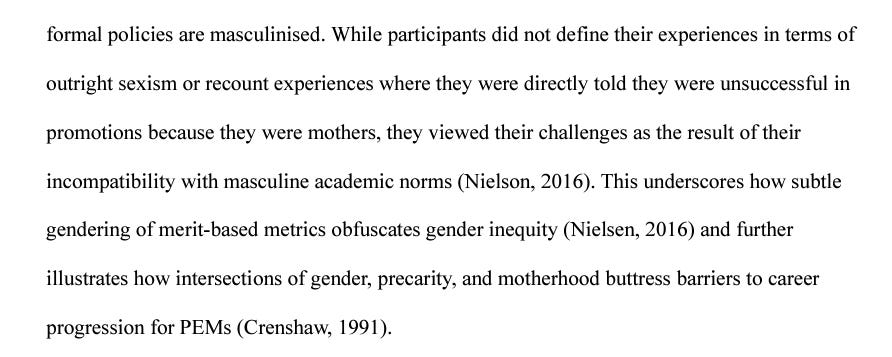Social Contagion and Circular Reasoning in the Academy
What happens when a hypothesis is dismissed because it lacks evidence, but evidence cannot be tested because the hypothesis has been dismissed.
Editorial Note: I have only provided light edits to this piece. Hollie is an Australian second-year PhD student in psychology researching adolescent gender dysphoria in relation to how the condition develops, particularly with regard to differences in historical and contemporary understandings of gender and identity development. She is interested in understanding recent shifts in the demographic and clinical features of gender dysphoria in young people seeking gender affirming care, and is interested in the idea of social and emotional contagions more broadly. This article reflects the author’s personal interpretations and opinions and should not be taken to reflect research consensus or institutional positions. Please forgive her for using British English.
One of the most fascinating things about the ‘social contagion’ theory of gender dysphoria, Rapid Onset Gender Dysphoria (ROGD) is the stunning way it has been dismissed without evidence by professional bodies and academics alike. Lisa Littman published her parent-report data in 2018 which hypothesised that recent increases in transgender identification among adolescents might be explained by a social contagion effect. She received what appeared to be an unusual level of backlash, including a seemingly unprecedented response from PLOS One. From there, the case against ROGD was mounted from every corner of the internet.
Since its publication the ROGD hypothesis continues to be dismissed on the grounds that it is anti-trans, methodologically flawed, and that it lacks empirical support. Methodological criticism has centred on Littman’s use of parent-report data, as though parent-report data attempting to answer research questions (or catalysing new hypotheses and research when parents observe something in their children) is a transphobic phenomenon reserved only for ROGD. This is, of course, not the case, as Littman addressed extensively in the correction to her study she was required to publish. Littman is correct to note that parent-report data is widely used in research, for example, a parent-report measure called the Child Behavior Checklist is regularly used in adolescent gender dysphoria research itself. The use of this measure appears not to garner any resistance or criticism from individuals or professional bodies when it’s used to report improvements in adolescent mental health following gender-affirming treatment.
Professional organisations including the now infamous World Professional Association of Transgender Health (WPATH) - and all the medical associations relying on WPATH for policy guidance - released statements explaining that there was no evidence for ROGD. Medical associations and professional bodies appeared to be closing ranks around WPATH and gender-affirming care in response to the perceived threat of ROGD. Unfortunately, following the slew of statements from WPATH and other professional organisations, activist-academics began publishing commentaries and think-pieces suggesting ROGD was hiding a “barren empirical wasteland”, adding further weight to the sense that there’s just nothing to see here. To this day, the Wikipedia page for ROGD is entitled ‘Rapid-onset gender dysphoria controversy’, characterising the idea not as a legitimate hypothesis deserving of testing, but as a “controversy”. Should you skim Wikipedia for information, ROGD presents as little more than an unfounded and unscientific idea, conceptualised with the express intent of harming trans children.

One might think the situation provided a clear imperative to researchers: gather data for analysis and begin to examine whether the ROGD hypothesis might find any empirical support. This is how research is supposed to be conducted, and further, it’s the only reasonable way to begin to put the entire contentious debacle to rest - strong evidence for or against ROGD. The research process adds another thread to the fabric of our understanding every time it’s undertaken (or, more specifically, every time it’s undertaken well). To that end, trans activist Julia Serano, though guilty of parroting WPATH’s concerns regarding the capacity of ROGD to limit adolescent access to gender-affirming care, has at least bothered to pose the question: what would it take to prove that ROGD is a novel condition?
In her article “debunking” ROGD, Serano provides several suggestions for how we might detect evidence of ROGD. Most importantly, she admits it could be supported with evidence. According to Serano, it would require evidence that there is a different cause of ROGD compared with typical gender dysphoria (sometimes called a ‘pathway to gender dysphoria’, or ‘aetiology’); it would take evidence that ROGD adolescents have different outcomes to other young people with gender dysphoria, and; it would take some method for distinguishing between the two, since as it stands, we don’t have a reliable way to distinguish between putative ROGD and non-ROGD groups.

Taking the suggestions outlined by one of the most vocal anti-ROGD trans activists seemed an excellent place to start in the effort mount a robust inquiry into the validity of Littman’s idea; if a study were to meet the evidentiary requirements of a strident anti-ROGD activist, it would surely be compelling.
There was a major tautological issue, however. The ROGD hypothesis was dismissed because it lacked evidence, and the backlash Littman, Brown University, and PLOS One received was so career-endingly caustic, it served to disincentivise academics and institutions from collecting evidence. I, along with a small number of academics, was not easily dissuaded.
In late 2022 I found myself in the first month of my PhD candidature, having been accepted and offered a full scholarship to study “the experience of becoming a mother from a feminist psychoanalytic perspective”, whatever that means. This, I must admit, was an attempt to compromise between my research background and my preferred direction, with my background being in post-structuralist, intersectional feminist conceptualisations of motherhood, identity, and value (quite the mouthful). As I looked to begin a PhD, I knew I wanted to pull away from the sort of feminist work I was becoming known for, so I squeezed the psychoanalytic perspective into my proposal.
It must be said that I was a difficult candidate for my supervisor, who had taken me under her wing and trained me in her area of research, thinking of me as a promising future-colleague. Unfortunately for both of us, post-structuralist feminist research had begun to seem little more than storytelling to me, an exercise in narrative construction and control; at best, a semantic sleight-of-hand. Newly concerned, I found myself preoccupied with questions like 'what on earth is photo-elicitation anyway?, and why does it seem that everyone doing this sort of research is simply using the veneer of academic jargon to state their opinion, couched in the legitimacy of peer-review? How can anyone peer-review a ‘lived-experience’ paper? Sure, it’s interesting, but can this actually be called research? Are non-academics taking shoddy feminist scholarship seriously and lecturing others to ‘trust the research’? I was becoming uncomfortable with what I was doing.

My undergraduate success in storytelling - ahem, I mean, post-structural feminist research - was rather spectacular, having been awarded near-perfect marks for my Honours research, a national prize for my thesis, and various other institutional awards and accolades. It was the methodology I was familiar with, and with the strategic guidance of my supervisor I was appearing to do it well. Nevertheless, with continually dawning horror, I was beginning to accept that it may as well have been an opinion column in some women’s magazine. The more my supervisor told me to frame my literature reviews around the story I wanted to tell, the more deeply I understood that some research was little more than institutionally and editorially sanctioned cherry-picking.
The realisation that I was simply opining led me to contend with the question of whether I actually had any skill as a researcher, or whether - perhaps - my previous success was simply institutional reinforcement for saying the right things. Academia, it turns out, will reward a young woman handsomely for doing little more than loudly and rudely claiming that academia itself is irredeemably sexist, that the concept of merit itself is sexist, and that patriarchy permeates every corner of the academic enterprise, as I did throughout my thesis. No one noted the irony that I was also the recipient of a women’s equity scholarship that had been awarded based on merit, to the exclusion of male undergraduates. Academia, it now seemed to me, had become somewhat masochistic. Whether such masochism might relate to the feminisation of higher education, I leave to the reader to decide.

Following the rejection of a further shift in the direction of my research, I endured a predictable but messy falling out with my supervisor. It seemed she didn’t like the prospect of supervising me to psychoanalytically explore the question of whether “the patriarchy” had manifested as a sort of modern monster in the psyche of the West, a grim fairy-tale for an a-mythical people re-orienting themselves in the fall out of superstitious religion’s continued skewering by modern science. Here I will not get into the great irony I experienced as I was intellectually undermined and thoroughly lambasted by a (feminist) woman in the academy, except to say that it amounted to a sort of personal and intellectual deconstruction far worse than anything I’d come close to experiencing at the hands of any man in academia. I suppose she was, as an academic, proficient in deconstruction.

My candidature was put on hold as I flailed about in the search for a new research topic, at which point I stumbled across a podcast interview with Abigail Shrier. Symptoms of gender dysphoria appearing to develop in an unprecedented population, potentially due to social contagion, set against a backdrop of automatically affirming care which may or may not be clinically beneficial? Intriguing!
I put together a research proposal laying out the case: I highlighted the repeated claims that there is no empirical evidence for ROGD and pointed out that this may be because empirical research with the potential population itself had not been conducted. I outlined the state of evidence for adolescent treatment and some of the key players, and I noted the issue of professional organisations appearing to make statements on gender-affirming care in bizarre self-referential patterns that failed simple fact-checking. Finally, I laid out the method by which I’d like to attempt to establish whether two (or more!) types of gender dysphoria might be empirically detected in an effort to assess the plausibility of ROGD.
In early 2023, having secured two willing supervisors, I sent the research proposal off for the consideration of my department heads. I expected the process to transfer my research topic to be a fairly simple matter, given I was a candidate who has already been accepted to the PhD program. I anticipated recommencing in around March of 2023, per advice from my department.

February ends, March passes by, and I’ve heard nothing. April rolls on. It quickly becomes apparent I’d not be starting when I had been advised. I’d taken to periodically sending follow-up emails to my department, to the person I know is responsible for reviewing my proposal, and to my new supervisor. It began to seem as though I was being institutionally ghosted. A month after I had been due to begin, I received a response:
“You have identified a gap in the literature, generated hypotheses and described methods to test those hypotheses. If I have one concern, it is that it is perhaps a little TOO orthodox… the use of terms like ‘clinically distinct’ suggests that gender dysphoria is a syndrome that can be understood through psychometric testing and then ‘treated’. An alternative, affirming view, would be that people are who they are… to a large extent that happiness or unhappiness [with their bodies] is constructed by social context and expectation… the positioning of the proposal seems to sit in the ‘assess-diagnose-treat’ framework used for clinical psychopathology, and this lens may not be the most helpful… the paradigm being proposed may pathologise the community being represented…”
My shock in response to this feedback eventually wore off. I held my ground in addressing the comments, for example reiterating firmly that I was wanting to explore whether subtypes might exist within a diagnostic category (clinical psychopathology) that was currently being used to entail treatment (gender-affirming care). Having been (kindly, it should be said) warned about the potential vitriol I might face in choosing to become embroiled with a ‘culture war’ issue that seemed to be steaming up to a rolling boil, I eventually returned to my office and set about the business of beginning a PhD. A term late was certainly better than never.
For anyone unfamiliar with the PhD or research process, at least in Australia, beginning a PhD entails a couple of potential obstacles: firstly, confirming the candidature by presenting and defending a refined research proposal to a panel of academics; and secondly, applying for approval from the human ethics committee, without which the data cannot be collected. At the first obstacle I stumbled.
It was during the process of confirming my candidature that I was asked to remove language such as “subtypes” of gender dysphoria from my proposal. I was asked to repeatedly sanitise the language of the project so as to render the final presentation as inoffensive as possible - or, at least, as inoffensive as something brazenly endeavouring to fairly assess evidence of ROGD can be considered within the current intellectual climate. It was recommended that I further remove reference to ROGD from my work entirely, never mind that it was the very thing I was trying to study, though I refused to do so and articulated my rationale. My candidature was confirmed, inclusive of ROGD terminology, in November 2023, and I have spent the subsequent 9 months consumed by the effort to obtain approval to collect data from my institution’s ethics committee, otherwise known as the second obstacle.
My research has three separate studies within it, two of which involve me collecting survey data from participants, and therefore two of which require ethical approval. For the first, my application was submitted in late November 2023. The usual turnaround time for an ethics application is a few weeks, and I should have received a response from the committee around mid-December 2023. Nevertheless, Christmas passes, and I returned to the office in the new year without hearing a peep. I emailed for updates, having submitted applications in the past (all feminist research), and having never had to wait more than a couple of weeks to receive a response. In fact, I once submitted an application to the ethics committee for feminist research on menstruation that was approved without any request for amendment, which is completely unheard of. Finally, in late January 2024, I was advised by the ethics committee that my application has gone to an ‘external consultant’ and had been subsequently delayed.
Eventually I received a response following an approximately three-month delay. The response from the committee contained some helpful methodological feedback, recommendations, and points of clarification that required addressing, and which strengthened the research overall. The response also contained a distinct (ostensibly non-committee) set of responses which appeared to be more akin to a tone-policing, language-monitoring, political review. It was here that I was required to address comments such as:
“Some researchers’ work noted in the review has been questioned in the field of trans and gender diverse affirmative care and have indeed caused anxiety and harm within these communities… major concern [regarding] whether this application has been developed in consultation with… a professional body such as AUSPath… concerns were raised that dysphoria is framed and reinforced within a framework of pathology, without a demonstrated understanding of gender dysphoria stemming from social context of transphobia and homophobia... What is the benefit of researching links of gender dysphoria to personality, to contagion, and possible regret? This is an argument often used against trans and gender diverse young people’s access to gender affirming care.”
It seemed as though I was engaging directly with a Florence Ashley narrative review masquerading as research, or Julia Serano comments section. I wondered whether the spirit of a Philosophy Tube post on X was animating the ethics committee to lecture me on whether gender dysphoria even existed?
Never mind, I suppose, that I laid out a rationale for questioning professional bodies such as AUSPath in the first place. Never mind that I was looking to explore a recognised diagnostic category i.e., I was very specifically seeking to improve understanding of a certain distress-based pathology. Never mind that it’s an open question as to whether dysphoria is at all socially constructed, and we shouldn’t begin with the conclusion that it is. Never mind that it’s atrocious research practice to shoot down a research project based on how some people may, possibly, use or misuse the findings of that research (if I wanted consequentialist nonsense, I’d go back to feminist research). And of course, never mind that we should be free to cite researchers who have published quantitatively robust, peer-reviewed work, regardless of the emotional experience it might engender in an unknown number of definitionally mentally ill people.
Despite all of this, I was advised by an expert researcher in the gender dysphoria field to undertake major changes to the project in response to the committee feedback, as it was becoming clear that I wouldn’t be permitted by the committee to continue with the research otherwise. The project no longer seeks to explicitly explore ROGD, though it does seek to understand the diverse pathways to gender dysphoria, of which it is plausible some version of social contagion may be one.

As far as I could tell, ideological capture appeared to be leading otherwise sensible intellectuals to disregard scholarship on emotional grounds. Further, it began to seem the norm to begin with quasi-axiomatic conclusions regarding contentious research questions that had no business masquerading as axioms, and which put all scholarship relying on the truth of these forgone conclusions in peril. For example, if scholarship begins with the conclusion that the experience of gender dysphoria is socially constructed and it’s later found not to be the case, all the scholarship which rests upon that idea - and all policy and procedure based upon said scholarship - collapses, and the academic house of cards is revealed. At any rate, this experience has left me with my own contentious question: how is it the case that universities - including mine - are able to purport to champion academic freedom and freedom of enquiry while simultaneously seeming to behave as unthinking risk-management drones and vocabulary police?
One potential answer that has occurred to me is that it is possible they do this specifically via ethics committees, who could perhaps be construed by some as operating as producers of plausible deniability. Technically the academy allows academic freedom! You can theoretically have a research project approved by other academics or your department! However, should it be controversial, oppositional, or otherwise unpopular, there is no risk to the academics or the institutions of backlash, or of being considered problematic for having theoretically approved it (thus technically ensuring academic freedom). There is no risk specifically because it will inevitably be changed or shot down entirely by the relevant ethics committees - or perhaps even the external, special interest consultants they hire. Institutions aren’t contradicting academic freedom, you see, merely following procedure. Merely preventing unethical research.
Which governmental or professional frameworks are used? Is it possible for the people responsible for developing those legal, binding ethical frameworks to be ideologically captured in the way some have argued other professional and accrediting bodies experience ideological and regulatory capture?
One must wonder, if we do continue to behave as consequentialists on questions of ethics and harm, what might such committees, institutions, and professional bodies have to say for themselves in the event that a consensus on the validity of social contagion is reached, and affirming adolescents in their preferred gender is consequentially found to harm more than help?
I leave that, too, as an exercise to the reader.








Congratulations to you for having disco ered the difference between story telling and research
And kudos for biting off such a contentious issue to start your journey of doing real research.
Keep plugging away!
Brilliant, and….terrifying. LSL, PhD